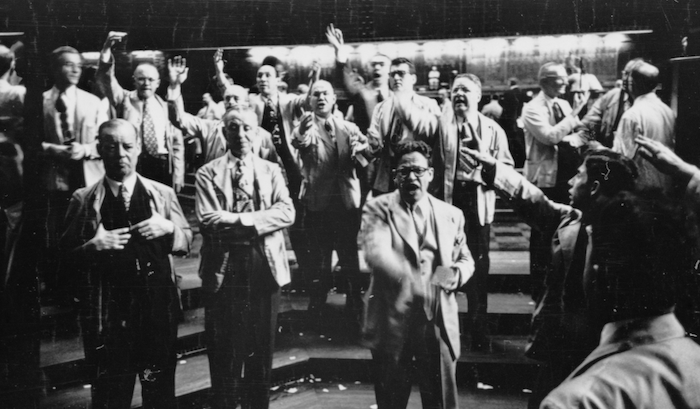Once a month here on the Molten Sulfur Blog, I run content taken from our book Archive: Historical People, Places, and Events for RPGs. This post is one of eighty entries in Archive, each more gameable than the last!
This post is brought to you by beloved Patreon backer Colin Wixted. Thanks for helping keep the lights on! If you want to help keep this blog going alongside Colin, head over to the Patreon page – and thank you!

The Great Onion Scheme
Audacious Financial Trickery
Vincent Kosuga was a short little onion farmer with big dreams. Unsatisfied with the money he was making from farming, he tried his hand at speculating in the Chicago futures market, which is kind of like the stock market, but with goods instead of stocks. His first attempts were in trading wheat futures, and they almost drove his family bankrupt. He had to borrow money to stay afloat, and his wife made him promise never to trade again. But a few years later in 1955, he tried an audacious scheme that made his fortune and drove dozens of onion farmers into bankruptcy.
This time, Kosuga was going to trade onion futures. A ‘future’ is a contract that obligates one party to buy something from another party for a set price on a particular date. An onion future is a way for an onion farmer to lock in a price at the beginning of the season. Even if the price of onions at the end of the season is terrible, the buyer of the future still has to pay the previously-agreed-upon price for the farmer’s onions. Kosuga’s plan was to buy onion futures at a normal price, drive the actual price of onions sky-high, then re-sell the onions at a profit.
As an onion farmer, Kosuga had an advantage when it came to trading onion futures: he knew the nature of the market well. Onion prices rose and fell rapidly in the ’50s. Around the harvest, the price of onions was usually high, because there hadn’t been any in so long and everybody wanted some. But right after the harvest, all the onion farmers would flood the market at the same time, trying to take advantage of those high prices. With so many onions suddenly on the market, prices would drop through the floor. Being an onion farmer, Kosuga had some influence in the market already, and he was willing to make some shady deals to increase his clout.
Once, Kosuga bribed an official at the Chicago weather station to issue a sudden severe frost warning. Frost would kill the onion plants. Fewer onions would mean higher prices. Buyers started snapping up onion futures like crazy, even as their prices climbed. No one wanted to be the sucker who had to buy onions at elevated market prices come harvest time. No frost came, but when the harvest rolled around, everyone holding onion futures had to pay the inflated prices they’d promised. It was the farmers, including Kosuga, who benefited.
Kosuga was just getting started. His greatest scheme began with an attempt to own every onion in Chicago. Kosuga had a friend, Sam Siegel, who owned a cold storage facility. Between the two of them, they could store every onion in the city. Kosuga bought all the other farmers’ onion futures. Come the fall of 1955, Kosuga and Siegel owned 98% of the onions in Chicago. With the supply of onions under their control, they could restrict their sale and charge what they wanted. They made a fortune.
Then they took it a step further. ‘Short selling’ is a way to make money by betting the price of something will fall. Kosuga set up short selling contracts on onions, and then opened his produce to all comers. He flooded the market, and onion prices plummeted. The price of onions fell from $2.75 per sack to $0.10 per sack in just six months. The onions were worth less than the sacks they were sold in. Because of Kosuga’s short selling contracts, he and Siegel made another fortune. Their scheme bankrupted dozens of onion farmers, who now had to sell their produce in a market where the price of onions was ruinously low. Kosuga and Siegel got away with it because their actions were legal at the time. In response to their scheme though, in 1958 the U.S. government enacted the Onion Futures Act, making it illegal to trade onion futures.
The Great Onion Scheme in Play
This event is a perfect example of how villainous schemes don’t have to be violent. Kosuga enriched himself by ruining both investors and fellow farmers, and he did it without breaking a single kneecap. At your table, PCs could catch wind of the great onion scheme when your version of Kosuga has bought half the onions in the city. They have to find a way to stop him before he buys the other half and drives the local farmers bankrupt. In a political campaign, the PCs might attempt the onion scheme themselves to ruin a rival who depends on agricultural revenue: perhaps a medieval baron or an agricultural mega-corporation. Or, if your PCs are villainous enough, they might just carry out the great onion scheme to get rich. Kosuga might approach them with the idea, hoping they’ll provide the capital and the details.






